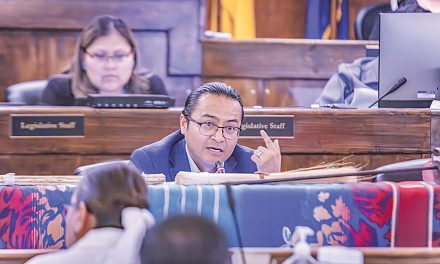
Letters: It’s school choice, not ‘opportunity’

The Native American Education Opportunity Act, introduced by Senator John McCain and supported by State Senator Carlyle Begay, is philosophically un-viable. There is no question Navajo families should be able to choose where their children attend school, but they shouldn’t have to pay more for their children’s education any more than they presently can’t afford.
As in so many legislative top-down mandates (which this is), devil is in the details. More troubling, though, isn’t what Sen. McCain and State Sen. Begay claim it will do for Navajo students, but the extra cost to Navajo families down the road.
The biggest concern of this bill, it’s a school choice bill masked as an opportunity bill. For years, Sen. McCain has been intent on destroying public education, which is a major education platform for Republicans. Sen. McCain has also been the biggest critic of Indian education, including Navajo public and BIE school education. Unfortunately, State Sen. Carlyle Begay agrees with his “boss.” They don’t value anything that Navajo families have to say nor do they bother to ask Navajo people what the best solutions are for addressing their children’s education, so it has to be another top-down mandate. Sen. McCain is notorious for not listening to his constituents north of I-10, and State Sen. Begay is agreeing to anything McCain is leading him to do.
If Sen. McCain and State Sen. Begay bothered to ask Navajo families and educators they would learn the best solution is to first fully fund Navajo schools, academics, facilities, transportation (especially road maintenance), teacher housing, technology, and more importantly, support for Navajo language and culture teaching. Navajo schools (whether it’s BIE or public) cannot compete with non-Navajo schools, especially in recruiting for high-quality educators.
Their bill suggests that it is better and more cost-effective if Navajo students were to take the funds as vouchers and attend schools elsewhere, most likely in urban schools, but what about the families? Who pays for their relocation expenses and who will employ them when they move into the city?
The only thing this bill does is support the wealthier students who have the means to drive to the transfer schools, while poorer kids are left catching the bus to their failing school. This is what has been the experience with vouchers and its impact on poorer families and neither Sen. McCain nor State Sen. Begay spoke about these concerns in their statements.
As one parent, I strongly recommend that a better option is to fully fund Navajo education at the highest level so it can compete with the very best and keep Navajo children and their families closer together. It is sad for Sen. McCain to use State Sen. Begay on an issue he has failed to advance by himself, and what a shame for State Sen. Begay agreeing to be misled.
Wallace Hanley
Window Rock, Ariz.
Who will clean up the coal mines?
An editorial on the Bloomberg.com (http://Bloomberg.com) website April 15 (http://www.bloombergview.com/articles/2016-04-15/the-lessons-of-peabody-energy-s-collapse) raises the alarming possibility that Peabody’s bankruptcy will leave taxpayers with the cost of cleaning up the environmental effects of coal mining. This may turn out to be a frustrating repetition of the uranium-mining debacle where uranium-mining companies declare bankruptcy, avoid any responsibility for cleanup, and then resume business-as-usual after reorganizing under a different name.
The Bloomberg editorial discusses “self-bonding,” which is in effect in four of the six states in which Peabody mines: Wyoming, New Mexico, Illinois, and Indiana. In the states where this is allowed, companies like Peabody are allowed to simply promise to clean up a mine, rather than being required to put up money or collateral to cover those costs. By Bloomberg’ estimates, the cost of surface mine cleanups may reach $1.15 billion.
There are many dangers associated with abandoning massive surface coalmines, as we have unfortunately learned in the case of the countless abandoned uranium mines where we live. Toxins make their way into the water supply, and recreation, farming, and grazing are impossible. Self-bonding extends to oil and gas companies, too, with implications for the tens of thousands of oil and gas wells in the San Juan Basin.
Requiring extractive industries to put up front the money required for their environmental obligations may push some into bankruptcy. However, letting them avoid remedying the damage they have done to the land is a disservice to those who live and make their living on it, especially after such companies declare bankruptcy, pack their bags, and leave taxpayers holding the bill. Then, adding insult to injury, resume business re-organized and free of their obligations. Coal is a dying industry, whereas renewables and other cleaner energy sources are growing industries. States like New Mexico that allow companies like Peabody to self-bond in order to scrape every last ton of coal out of the ground with no concern for cleanup, are not doing their constituents any favors.
Rick Strassman
Gallup, N.M.
To read the full article, pick up your copy of the Navajo Times at your nearest newsstand Thursday mornings!
Are you a digital subscriber? Read the most recent three weeks of stories by logging in to your online account.







 Highway 264,
Highway 264, I-40, WB @ Winslow
I-40, WB @ Winslow